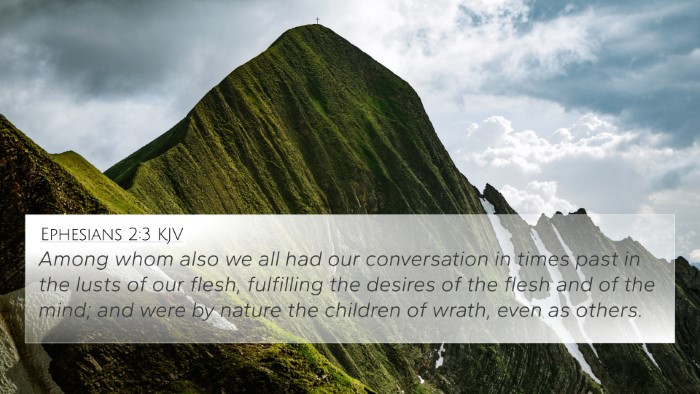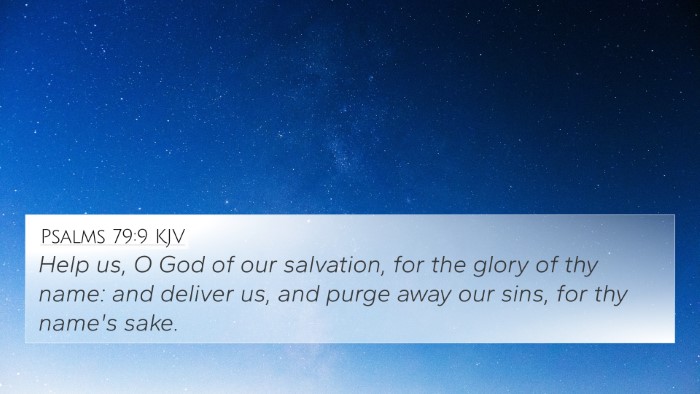Ezekiel 16:63 - Summary and Interpretation
Ezekiel 16:63 states: "That thou may remember, and be confounded, and never open thy mouth any more because of thy shame, when I am pacified toward thee for all that thou hast done, saith the Lord GOD." This verse encapsulates a profound message of reflection, repentance, and grace from God towards His people.
Understanding the Context
In this chapter, God speaks through Ezekiel to address the unfaithfulness of Jerusalem, depicted as an unfaithful wife. The prophetic imagery emphasizes Israel's disgraceful actions and the need for recognition of her sinful state. The shame mentioned is a significant aspect, highlighting the moral and spiritual failures that lead to divine rebuke.
Commentary Insights
-
Matthew Henry:
Henry emphasizes the notion of remembering one’s past sins in a way that brings humility and contrition. The shame is not merely about feeling guilty; it is a profound recognition of the gravity of one’s actions before a holy God. God's intention is to restore rather than to destroy, showcasing His mercy.
-
Albert Barnes:
Barnes elaborates on the significance of being "pacified" by God, indicating that God's forgiveness is part of His covenantal love, which includes a promise of restoration. The verse calls for a lasting change in attitude and behavior, where the people will no longer take their relationship with God for granted.
-
Adam Clarke:
Clarke highlights the conditional aspect of God’s favor, signifying that acknowledgment of one’s sins and the resultant humility are essential for receiving God’s mercy. The shame directed towards Jerusalem serves as a powerful reminder of the consequences of idolatry and spiritual adultery.
Bible Verse Cross-References
Ezekiel 16:63 provides a wealth of connections with other scriptures, illustrating the themes of shame, repentance, and redemption. Here are some related Bible verses:
- Jeremiah 3:25: "We lie down in our shame, and our confusion covereth us..." - a direct connection to the theme of shame.
- Isaiah 54:4: "Fear not; for thou shalt not be ashamed..." - God's promise of restoration and the removal of shame.
- Romans 3:23: "For all have sinned, and come short of the glory of God." - echoing the universal nature of sin.
- 2 Corinthians 7:10: "For godly sorrow worketh repentance to salvation..." - emphasizing the transformation through genuine remorse.
- Psalms 25:2-3: "O my God, I trust in thee: let me not be ashamed..." - a plea for God's help and reassurance.
- 1 John 1:9: "If we confess our sins, he is faithful and just to forgive us..." - showcasing the necessity of confession for reconciliation with God.
- Hebrews 8:12: "For I will be merciful to their unrighteousness..." - reinforcing God's grace post-repentance.
Thematic Connections
The themes in Ezekiel 16:63 can be linked to a broader understanding of the biblical narrative. The interconnectedness is vital for grasping how God's dealings with humanity unfold across scripture.
- Shame and Redemption: The acknowledgment of shame often precedes divine mercy, a recurrent motif in scripture.
- God's Faithfulness: Despite Israel's repeated failings, God’s covenantal commitment remained steadfast, providing a promise of restoration.
- Repentance: The necessity of acknowledging sin serves as a vital step towards experiencing forgiveness.
Concluding Thoughts
Ezekiel 16:63 serves as a poignant reminder of the human condition in relation to divine holiness. The need for repentance intertwines with the assurance of God's mercy. For those engaged in in-depth Bible study, utilizing tools for Bible cross-referencing can offer richer insights into themes of shame, forgiveness, and restoration found throughout the scriptures.
Additional Resources for Bible Cross-Referencing
- Consult a bible concordance for cross-references.
- Explore bible cross-reference guide tools for deeper studies.
- Engage in cross-reference bible study to identify thematic parallels.
- Utilize comprehensive materials for systematic study across the Bible.



















